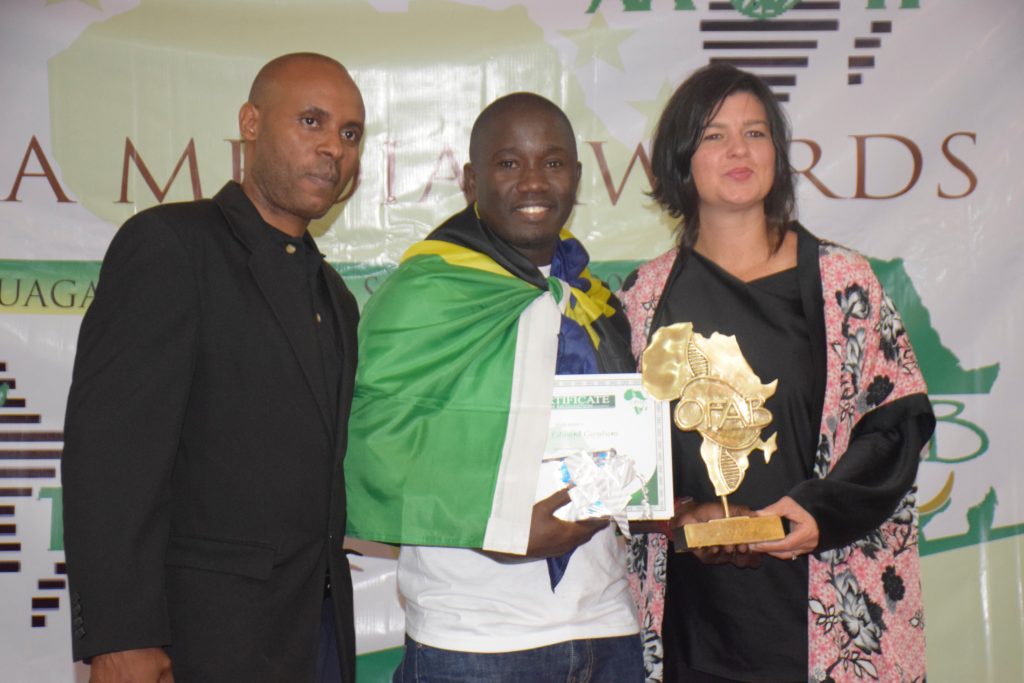Calvin Edward Gwabara, a Tanzania TV reporter and 2018 Cornell Alliance for Science Global Leadership Fellow, has been named Journalist of the Year by the OFAB Media Awards.
Gwabara, who is attending the 12-week Fellows program at Cornell University, flew to Burkina Faso to accept the prestigious prize at a ceremony last night. The award, which spans the African continent, is sponsored by the Open Forum on Agricultural Bioechnology (OFAB) to recognize outstanding science reporting.
“We as journalists must specialize in a specific area so that we can be competent in our reporting,” Gwabara said. “I am happy to be a science journalist who deals with farmers’ challenges and successes because more than 75 percent of Tanzanians depend on agriculture for their livelihood. I am so happy to serve these millions of Tanzanians, because agriculture is our backbone.”
It’s a deeply personal calling for Gwabara, who comes from a farm family. He initially was unable to attend high school because his father suffered a very poor harvest from his 5-acre farm — just 100 kilograms of maize, insufficient to even feed the family, much less pay school fees — the year he was selected. At the same time, Gwabara recalled reading a newspaper article explaining how another farmer had harvested 3,500 kg of maize from just one acre of land using more modern techniques, such as fertilizer, proper crop spacing and good seeds.
“The only thing my father missed was technology and the best practices of agriculture,” Gwabera told the crowd in recounting the story and accepting his award. “I told my father then I wanted to be a journalist, so I can help solve the problems our farmers face.”
Gwabara was named winner of the television category, as well as overall best journalist. Other winners are Brian Okinda of Kenya for print and online reporting and Philip Bagyiliko Tengzu of Ghana for radio.

“The purpose of the OFAB Journalist of the Year award is to help drive innovation in science reporting in Africa through a recognition and reward system,” said Daniel Otunge, the Nairobi-based coordinator of the OFAB network. “Our work as advocates for a better, functional biotech policy and regulatory environment would be impossible without the media being in the mix in a positive way.”
Philbert Nyinondi, coordinator of OFAB Tanzania, agreed that “media houses, and particularly journalists, have a vital role to play in saving agriculture on the continent.” He said it is challenging to deliver new technologies to farmers in Africa, primarily because they have limited access to information.
“The OFAB media award is a way of recognizing and appreciating our ‘heroes’ — journalists who are patriotic and courageous enough to write on the controversial topic of biotechnology to educate the public and bring in better tools for better harvests and better lives,” Nyinondi said. “These journalists are connected to farmers and they live in farming communities. They are working hard to fight poverty by providing useful information that can transform our economies.”
Nyinondi, who was a 2015 Global Leadership Fellow, nominated Gwabara for the intensive course, which trains participants in the science behind agricultural biotechnology, as well as communications, public speaking and social media skills. Gwabara had just arrived at Cornell when he learned he had won the OFAB award for his television reporting on how farmers are struggling with the fall armyworm pest and uncertainties in cotton cultivation, as well as tissue culture work that offers hope for banana farmers dealing with losses from bacterial wilt.
“I also thank the Cornell Alliance for Science for what they do to empower science communicators around the world because people lack accurate information,” Gwabara said. “So they end up with the wrong information from the wrong people who hate biotechnology, but are unable to provide any alternatives.”
In the past, Gwabara said, African scientists didn’t want to talk to journalists because they were afraid of being misquoted. “But now they call and communicate well with us,” largely because the reporters are better informed about science and biotechnology, he said.
Dr. Sarah Evanega, director of the Alliance for Science, was on hand to see Gwabara accept his award. “Calvin is a shining example of the dedicated, compassionate and deeply caring people who attend our Fellowship program,” she said. “They are working to reduce poverty and hunger and improve the lives of smallholder farmers in their own countries, and around the world.”
